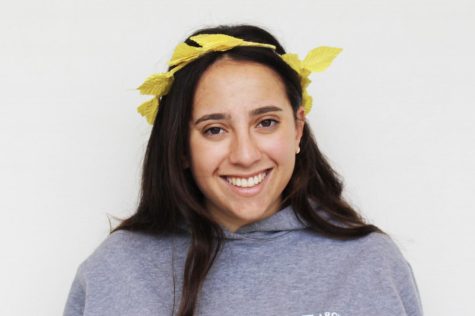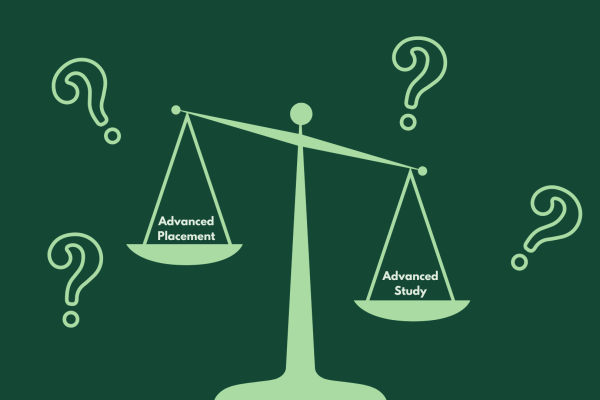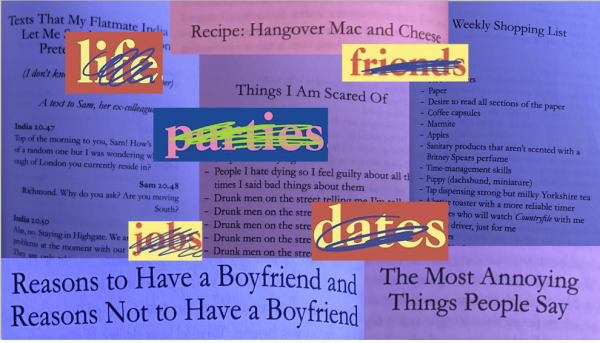Commentary: So you think you can vote?
Photo credit: Jacque Giebel
Students pre-register and register to vote on Monday, Sept. 23. The event was hosted by the Human Rights Watch Club. Allie Worchell ’20 is pictured in the center.
In June, I turned 18. While this age brings many privileges, it also brings a newfound sense of responsibility. During every family gathering, social event or interaction with an adult, I am asked my least favorite question: “Who will you vote for?”
My face goes blank and my jaw drops to the floor. Who am I voting for? The short answer, the one I want to say, is “I have no idea.” Yet I feel like this is unacceptable. After all, I am an adult now. So I usually say Joe Biden (he’s a favorite in my family). But as I think and overthink this response, I question my initial answer. Why did I say Joe Biden? What about him makes me think he should be President of the United States?
Soon, I start to realize that this response is due to my parents’ “indoctrination” of me. According to a 2009 study in the Journal of Politics, parents who are more politically engaged and have consistent views on political issues tend to sway their children’s politics.
It is safe to say that I am a product of this statistic. Whether it was my aunt forcing me to go to her Democratic Club or my mother rambling on over her obsession with Joe Biden, I have always been around liberal-leaning people.
So now it’s time to make my own decision…and I’m scared.
After seeing the outcome of the last election, I know my voice matters. According to an article by NPR, in July of 2018, the Democratic primary for Baltimore County was decided by 17 votes. In the 2016 election, Donald Trump got 70,000 more votes in three states, winning the electoral college and the presidency.
With 19 Democrats running for office, how do I choose? Joe Biden is quickly pulling ahead in the polls with a 26% national average as well as 22 million dollars in donations. Yes, he is no doubt experienced, but old, white men are all too common in American politics. I want the 2020 election to be a time for real change, new perspectives and diversity. But I am always drawn back to this moral question: Do I vote for someone who has a chance of beating Trump or someone who aligns with my values?
Trump attacks the media, women and immigrants as well as supporting agendas such as pro-life. Right now, I consider myself liberal, and I do not feel supported or heard by these ideals.
With the election approaching and the vast selection of candidates, it’s important to understand the voting process. So I’ve compiled the following tips for other first-time voters.
This article from votesmart.org gives a detailed description of all things voting.
First, you need to decide what you are looking for in a candidate. What leadership qualities do they present that make them a strong candidate? What policies do they support? What do they not support? When you are deciding what you want out of a candidate, think from both a local and national perspective.
Now that you know WHAT you are looking for, you need to find out WHO these candidates are. Time Magazine has compiled a great list of all the running candidates. It includes qualifications, rationales and controversies. Looking at these three factors gives a holistic view of each candidate. I urge you to make a document where you keep all your notes on each candidate. Do not stop here. Keep checking the news, looking at speeches that each candidate gives and maybe even following the candidates’ social media (remember, though, a candidate’s social media is just self-promotion).
After learning about the candidates, keep thinking about what you are looking for in the President of the United States and take notes. Over time, certain candidates get more popular while others drop out. Make sure to check the news to see recent updates. Sometimes a person’s action can change your perspective.
Keep the notes updated. They should have likes and dislikes about each candidate you are considering. If you find that there are more negatives than positives for a certain candidate, consider not voting for them. When it is time to vote, look over these notes and see who you connect with most.
I still don’t know how I’m going to vote, but with research, debate-watching, and staying up to date with the news, I’ll be ready once the primaries roll around…and you will too! Your vote is a personal decision, so remember that your voice matters and make an educated decision. With that, I say happy voting!

Allie Worchell joined The Oracle writing staff in 2017. This year she is excited to be a member of the editorial board as the Voices Editor. In school,...





![Freshman Milan Earl and sophomore Lucy Kaplan sit with their grandparents at Archer’s annual Grandparents and Special Friends Day Friday, March 15. The event took place over three 75-minute sessions. “[I hope my grandparents] gain an understanding about what I do, Kaplan said, because I know they ask a lot of questions and can sort of see what I do in school and what the experience is like to be here.](https://archeroracle.org/wp-content/uploads/2024/03/grandparents-day-option-2-1200x800.jpg)



























































Jim Russo • Oct 26, 2019 at 5:52 am
Great article, Allie! Such a thoughtful perspective. Ww need more informed voters like you!
Marla Terry • Oct 22, 2019 at 8:30 am
Great article. It’s nice to hear you are taking such a measured and methodical approach to this important civic responsibility. Many of us adults could take a page from you playbook.
Ms. Giebel • Oct 22, 2019 at 8:02 am
Wonderful article Allie! I really appreciate the thoughtful approach you are taking in the voting process as well as the tips you have provided to help others make a well informed decision. Thank you!